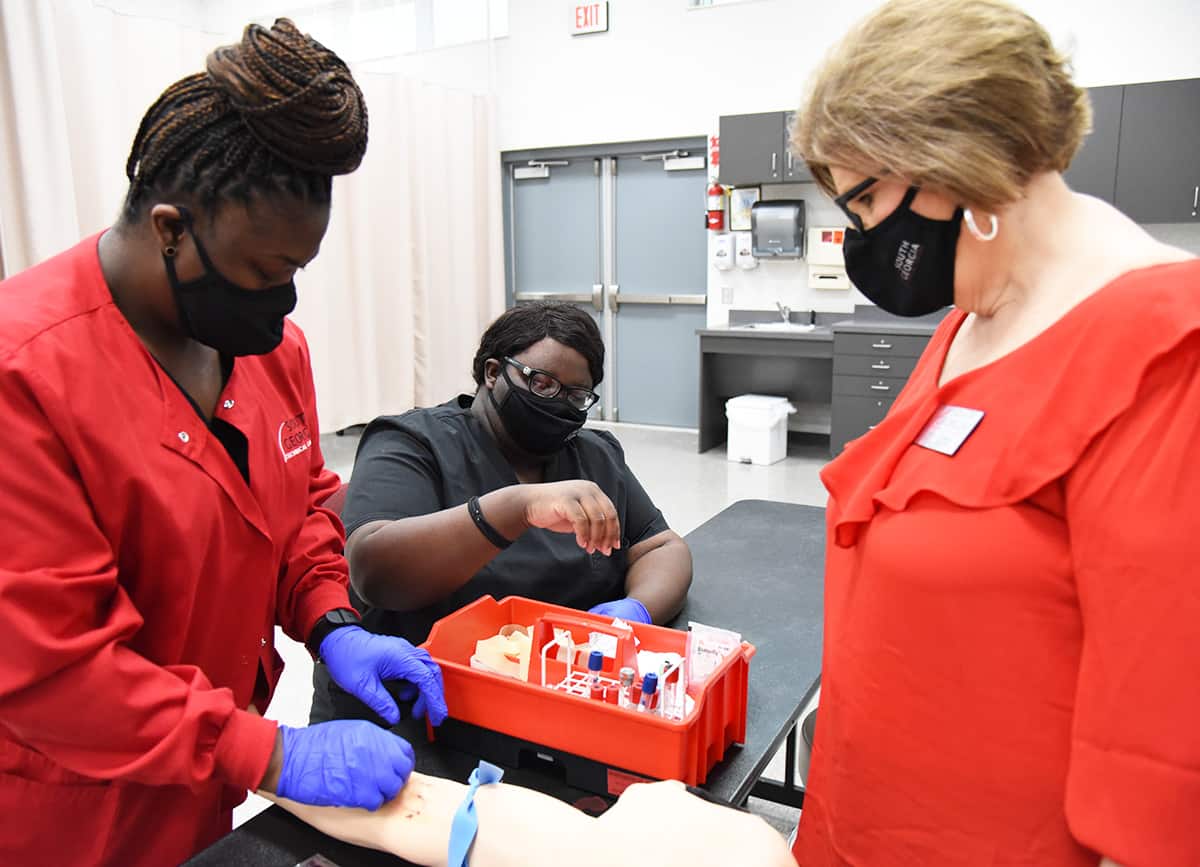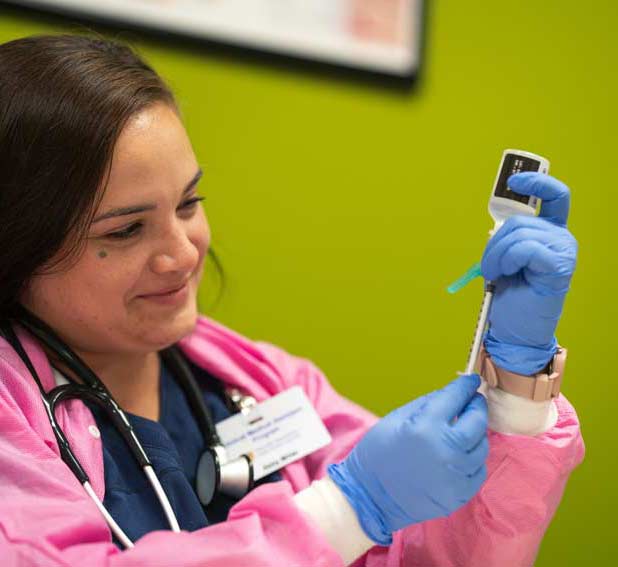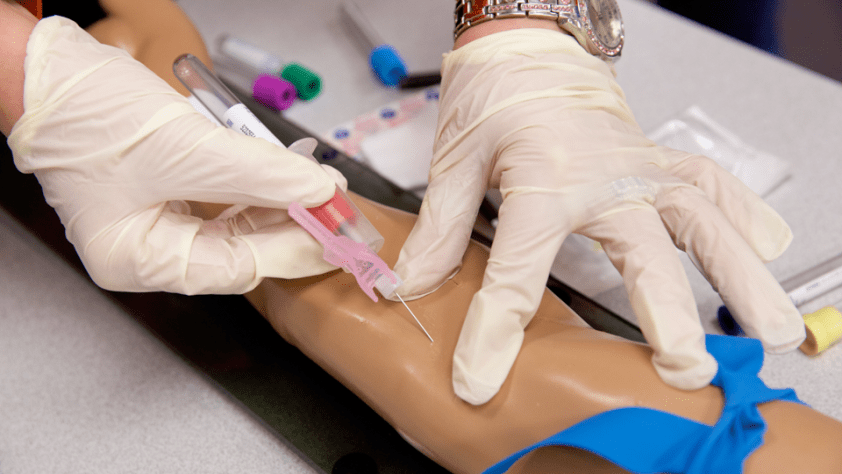Your Blueprint to Starting Phlebotomy school With Confidence
Wiki Article
The Path to Accreditation: Recognizing the Phlebotomy Training Training Course Trip and Its Importance
As you take into consideration the path to accreditation in phlebotomy, it's crucial to recognize the function you'll play in health care. Your training will cover vital skills, from blood collection methods to patient interaction.
The Duty of Phlebotomists in Health Care
Phlebotomists play a vital role in the healthcare system, acting as the essential link in between patients and crucial analysis screening. You'll perform blood attracts, making certain examples are collected precisely and securely. Your proficiency assists in diagnosing medical problems, keeping track of wellness, and directing therapy choices.In your daily interactions, you'll require to develop count on with individuals, making them feel comfortable throughout what may be a stressful experience. You are in charge of labeling and handling samples carefully to stop contamination or errors, which can affect examination results.
Past this, you'll often work together with medical professionals and registered nurses, communicating vital info concerning patients' conditions. By grasping your abilities, you add meaningfully to person treatment, making you an indispensable part of the medical team.
Summary of Phlebotomy Training Programs
When checking out phlebotomy training programs, you'll find different types developed to fit different routines and discovering designs. Each program assists you establish necessary abilities like blood collection and individual communication. Comprehending these choices is crucial to selecting the ideal course for your profession.Types of Training Programs
Several sorts of training programs are available for those looking to become competent in phlebotomy. You can select from certification programs, which commonly last a couple of months and concentrate on necessary skills. There are also diploma programs that provide a more detailed education and learning, typically lasting as much as a year. If you're searching for a deeper understanding, an associate level in an associated field may be the appropriate fit. On the internet programs offer adaptability for those balancing job or family members commitments, allowing you to research at your very own speed. Furthermore, some hospitals and facilities provide on-the-job training programs, giving sensible experience while you discover. Whatever path you choose, each program aims to furnish you with the required abilities for an effective phlebotomy job.
Trick Skills Developed
Mastering phlebotomy requires a set of key skills that are developed with extensive training programs. You'll find out technological abilities like appropriate capillary selection, needle insertion, and blood collection techniques. These hands-on methods ensure you can execute treatments securely and efficiently. Additionally, communication skills are essential; you'll need to engage with individuals, clarify treatments, and put them secure. Understanding composition and physiology is important, also, as it aids you situate veins and understand the body's response to blood attracts. You'll obtain expertise of safety and security procedures and infection control, guaranteeing you preserve a sterile environment. Each of these skills is essential for your success as a qualified phlebotomist, making you a beneficial property in any kind of health care setting.Key Elements of a Phlebotomy Program
In a phlebotomy training course, you'll concentrate on important subjects that lay the groundwork for your future career. You'll take part in hands-on training that allows you to use what you've discovered in real-world setups. Both the core educational program and practical experience are essential for your success as a phlebotomist.Curriculum Review
While pursuing a phlebotomy training program, you'll come across a curriculum created to equip you with essential abilities and knowledge. Phlebotomy Training Course. This educational program usually consists of anatomy and physiology, concentrating on the blood circulation system and understanding blood elements. You'll additionally learn more about various types of blood collection techniques, including venipuncture and capillary puncture methodsAdditionally, infection control and security protocols are necessary parts, ensuring you recognize just how to maintain a clean and sterile environment. You'll research patient interaction, highlighting communication and compassion, which are important for alleviating patient anxiety.
Hands-On Training Experience
Obtaining hands-on experience is a vital component of your phlebotomy training course. This sensible training allows you to apply what you have actually learned in a real-world setup, improving your abilities and confidence. You'll practice venipuncture strategies, find out just how to take care of different types of samplings, and obtain aware of the tools utilized in the area. Under the support of skilled trainers, you'll improve your abilities, guaranteeing you're prepared for any type of circumstance you might face.Additionally, you'll obtain the possibility to engage with individuals, which is important for establishing your interaction skills. This combination of technological proficiency and social skills is essential for your success as a certified phlebotomist. Inevitably, hands-on training is where theory satisfies practice, solidifying your knowledge and preparedness for qualification.
Qualification and Licensing Requirements
Before you can start your job in phlebotomy, it is important to understand the certification and licensing needs that differ by state. Most states require phlebotomists to hold an accreditation from an acknowledged company, such as the National Phlebotomy Association or the American Society for Professional Pathology. These certifications normally entail passing an exam that examines your understanding and abilities in the area.In enhancement to qualification, some states have details licensing requirements. You might need to finish a particular number of hours in professional practice, send evidence of training, or undertake a background check. It is necessary to investigate your state's laws to make certain you meet all necessary requirements.
Staying informed concerning these demands not only aids you protect a position yet likewise boosts your trustworthiness as an expert. By meeting these needs, you'll be well on your way to an effective profession in phlebotomy.
Hands-On Training and Practical Experience
Hands-on training and functional experience are vital parts of your phlebotomy education, as they permit you to apply academic knowledge in real-world circumstances. Throughout your training, you'll engage in supervised venipuncture, discover correct techniques, and end up being acquainted with different blood collection equipment. This direct participation is essential for developing your confidence and developing your abilities.You'll function very closely with experienced specialists who can assist you with the subtleties of individual communication and example handling. Each practice not only enhances your understanding however likewise prepares you for the busy setting of medical care setups.
Additionally, numerous programs include scientific turnings, permitting you to experience varied settings, from health centers to outpatient clinics. This direct exposure helps you adjust to various obstacles and client requirements, guaranteeing you're well-prepared for your future role. Welcome these chances, as they're vital to becoming a proficient and compassionate phlebotomist.
Challenges Faced Throughout Training
While getting hands-on experience is essential, it's vital to recognize the difficulties that can develop throughout your phlebotomy training. In addition, grasping the skills required for blood draws takes technique; you might battle with strategy initially.Time monitoring can additionally be an obstacle, as harmonizing theory, sensible sessions, and personal dedications can really feel challenging. You might encounter differing discovering speeds amongst your peers, causing sensations of insecurity if you believe you're falling behind. Adapting to the different characters of teachers can be difficult, as each may have a distinct teaching style.
Acknowledging these obstacles at an early stage can prepare you for success and aid you establish strength throughout your training journey.
Career Opportunities After Accreditation

As you gain experience, you may also think about specializing in locations like pediatric or senior citizen phlebotomy, dealing with particular patient needs. Some phlebotomists select to progress their professions by becoming lab professionals or going after more education in medical care fields.
Additionally, your accreditation can result in roles in training or supervising new phlebotomists, permitting you to share your understanding. With the medical care market continuously expanding, your abilities will always be in need, leading the way for a stable and fulfilling job. Accept the opportunities waiting for you!
Frequently Asked Concerns
What Is the Typical Period of a Phlebotomy Educating Course?
Phlebotomy training programs usually last around 4 to eight weeks. You'll take part in hands-on method, classroom direction, and on the internet learning. Completing this training prepares you for qualification and a gratifying occupation in health care.Are Online Phlebotomy Courses Available?
Yes, on-line phlebotomy courses are offered. They use versatility and benefit, permitting you to study at your own pace. Simply confirm the program is recognized to meet certification demands and acquire useful skills for your profession.Just How Much Does Phlebotomy Training Usually Cost?
Phlebotomy training normally sets you back between $700 and $2,500, depending on the program and location. You should take into consideration aspects like course size, consisted of materials, and hands-on experience when selecting the best training for you.What Are Usual Requirements for Phlebotomy Training?
Usual prerequisites for phlebotomy training typically include a secondary school diploma or GED, immunizations, and a history Phlebotomy Classes Near Me check. Some programs may additionally call for standard health care knowledge or accreditations, guaranteeing you're prepared for hands-on training.Can I Work While Finishing My Phlebotomy Training?
Yes, you can function while finishing your phlebotomy training. Many students equilibrium tasks with their studies, however make sure to manage your time effectively to guarantee you meet both job and training dedications effectively.Report this wiki page